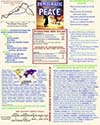
Before the election of Barack Obama, much was written about the democratic peace, pro and con. Presidents Bill Clinton and George W. Bush based their foreign policies on it—as one of its pillars for Clinton, and as the core of Bush’s policy. But now, you hear almost nothing of it. In this and in subsequent blogs, I will try to determine what has happened to the democratic peace.
First, what is the democratic peace? There are the narrow and broad versions. The narrow one, being most well known and researched, simply says that democracies have never made war on each other. This is the most scholarly and scientifically researched idea of international relations, and as a result many students of the field now consider it a political law of the international system. Therefore, promoting democracy in the world is a way to peace, which Bush and Secretary Rice said many times.
The broad version includes the narrow and adds that democracies have the least internal violence and almost no domestic democide. Thus, by fostering human security, democracies serve as a way to peace and human betterment. There is also much research on this version, although discussants of the democratic peace usually have the narrow one in mind.
What are my sources for this? I have two bibliographies of democratic peace research and commentary, one for those published <A HREF=”http://www.hawaii.edu/powerkills/BIBLIO.HTML”>before 2000</A>, and the other, just completed, <A HREF=”http://www.hawaii.edu/powerkills/DP.BIBLIO.2009.HTM”>2000 and after</A>. My interest is in the latter, since this will help answer the question about the current status of the democratic peace. To those to whom the democratic peace is an extraordinary idea, and in terms of peace, an unbelievable, idealist one, the earlier bibliography will be very useful. It presents the birth, replication, and early attempts to falsify the idea. Moreover, see my <A HREF=”https://democraticpeace.wordpress.com/”>Democratic Peace Blog</A>, which includes many <A HREF=”http://www.hawaii.edu/powerkills/Z.BLOG.ARCHIVE.HTM”>analyses of the studies listed in this bibliography.</A>
On balance, the bibliographies show that despite the negative critiques, attempts to falsify it, and assertions about negative cases, the democratic peace still provides a well researched and verified solution to war, democide, domestic violence, and human insecurity.
In Part II on the democratic peace, I will treat the idea within a foreign policy framework (such as Obama’s). The death of this solution to war and human security then will be easier to understand.



 Posted by rudyrummel
Posted by rudyrummel 






